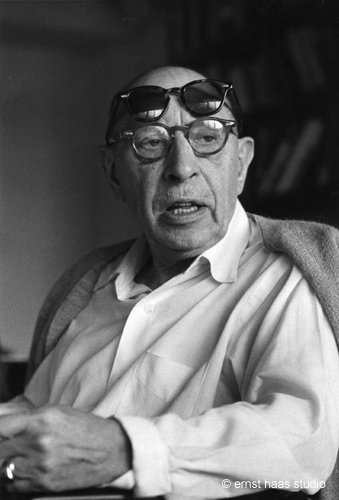Léonie Sonning Prize 2003
The Hungarian composer György Kurtág received the Léonie Sonning Music Prize of 500,000 Danish kroner on Thursday 18 September 2003 at the Radio House Concert Hall in Copenhagen. The concert was broadcast live on the Danish Broadcasting Corporation’s P2 radio channel.
The prize was presented by the editor Steen Frederiksen, chairman of the Léonie Sonning Music Foundation’s board, who in his speech included the following comments:
‘György Kurtág believes that his music must speak for itself, and that he cannot speak about it. Of course, one can analyze your music, but as with great art, you cannot analyze its essence. So much has been written about your music – because it does in fact invite analysis – that it is unnecessary to add anything new. But there are these few words from István Baláz: Kurtág’s works clarify, they awaken the consciousness in the best sense of the word – not aggressively like the avant-garde nor ideologically or dogmatically. Kurtág’s music teaches me to exist. In its beauty it will not let us forget the world’s vices. It will liberate.’
citation
The Léonie Sonning Music Prize 2003, of 500,000 Danish kroner, is awarded to György Kurtág, one of the most significant composers of our time. Kurtág’s condensed, aphoristic and poetic music is a genuine and strong defense of humanity. At the same time, it is innovative and familiar music that with its deep roots in the historical and musical past, carries the torch of European culture.’
You can listen to the award speech (in German) and the motivation (in Danish) here:
The programme
Schubert Symphony No 8, Unfinished
György Kurtág … concertante … op. 42, for violin, viola and orchestra
Bartók The Miraculous Mandarin
Participants
Hiromi Kikuchi, violin
Ken Kakii, viola
Danish National Symphony Orchestra
Michael Schønwandt, conductor
The orchestral work …concertante…, which was commissioned by the Foundation and was premiered at the prize concert, was awarded the prestigious American composition prize The Grawemeyer Award in 2006.
Kurtág in Denmark
In 1987, a selection of Kurtág’s works was performed at the Musikhøst Festival. It was the first major presentation of the composer’s works in Denmark. In advance of the prize concert, an extended issue of the journal Dansk Musik Tidsskrift focusing on Kurtág was issued. August 2003 saw a wide range of Kurtág’s chamber works performed, including his Wind Quintet Op 2, Three Old Inscriptions Op 25, Three Pieces for Violin and Piano Op 14e, Hommage à Robert Schumann Op 15d and Kafka Fragments, Op 24.
In connection with the prize concert, on 15 September 2003 Kurtàg held a master-class with the Paizo Quartet (Mikkel and Kirstine Futtrup, Magda Stevenson and Toke Møldrup) at the Royal Danish Academy of Music.
The Athelas Sinfonietta Copenhagen under conductor Christian Eggen played two concerts with music by Kurtág at the Louisiana Museum of Modern Art (14 September) and the Radio House Concert Hall in Copenhagen (16 September).
Programme
Kurtág … quasi una fantasia …, for piano and chamber orchestra
Kurtág Jelek op. 5, for solo viola
Kurtág Four Capriccios op. 9, for soprano and chamber ensemble
Kurtág Szálkák op. 6, for cimbalom solo
Kurtág Hommage à Robert Schumann op. 15d, for clarinet, viola and piano
Two days after the prize concert, Márta and György Kurtág gave a performance of music for four-hand piano at the Radio House Concert Hall. On the programme were works by Kurtág as well as his own transcriptions of music by Johann Sebastian Bach. The concert was broadcast live on the Danish Broadcasting Corporation’s P2 radio channel.
The Daily Press wrote among other things:
Everyone came to see him get the big Danish music prize. Did he deserve it? Both the chosen soloists, violin and viola, swallowed all their notes so you hardly heard them. There were nothing but echoes from a distant time. The award-winner’s concerto is truly quiet and fragile. You feared he had nothing to say, until mid-way through. The sound petered out completely. New movement. A small, curvaceous and transparent sound emerged, picked out of the oblivion of history. Then another, and perhaps the hint of a third. We Danes feel at home. Because it sounds like a greeting to our own Per Nørgård and his Symphony No 3, for example. And yes, he is a real award-winner, with his beloved Schubert first and his beloved Bartók afterwards. What came in the middle felt like a necessary parentheses.
(Søren Schauser, Berlingske Tidende, 20 September 2003)
We heard a sequence of music that moved to silence and back again, but which also made the orchestra’s pulse beat with heat and passion. Despite using a large symphony orchestra – and despite their unusual use of mutes and silencers – the voices of the two solo instruments soloists never had any problems floating out over the orchestra. It was first and foremost because the orchestra’s contribution came stealthily, as if dripping, like a pulse – like the creation story: “in the beginning was the note”, stubbornly maintained by the soloists. After that a musical universe was unfolded. When the silky-soft solo voices sounded, Kurtág had taken us into a new universe, in which the promised 24 minutes had held us enraptured. All you wanted was to hear the concerto again.
(Thomas Michelsen, Politiken, 20 September 2003)





